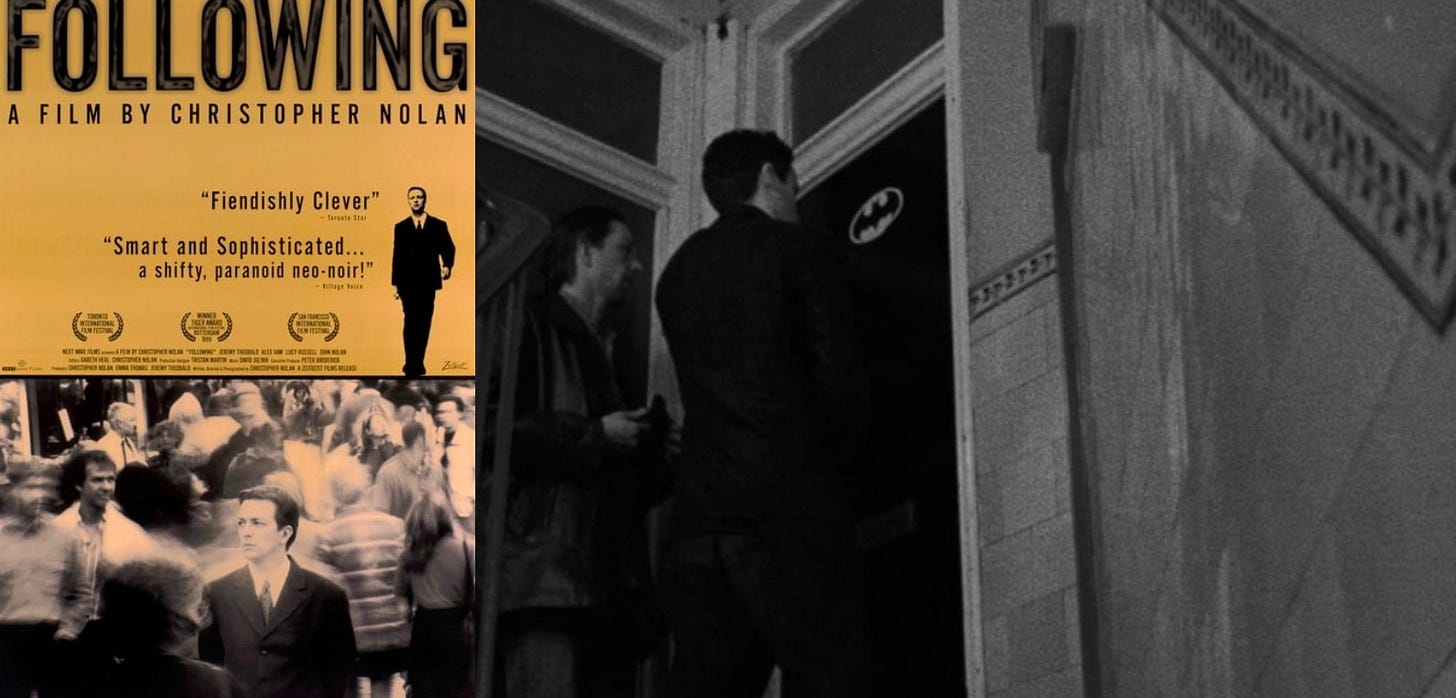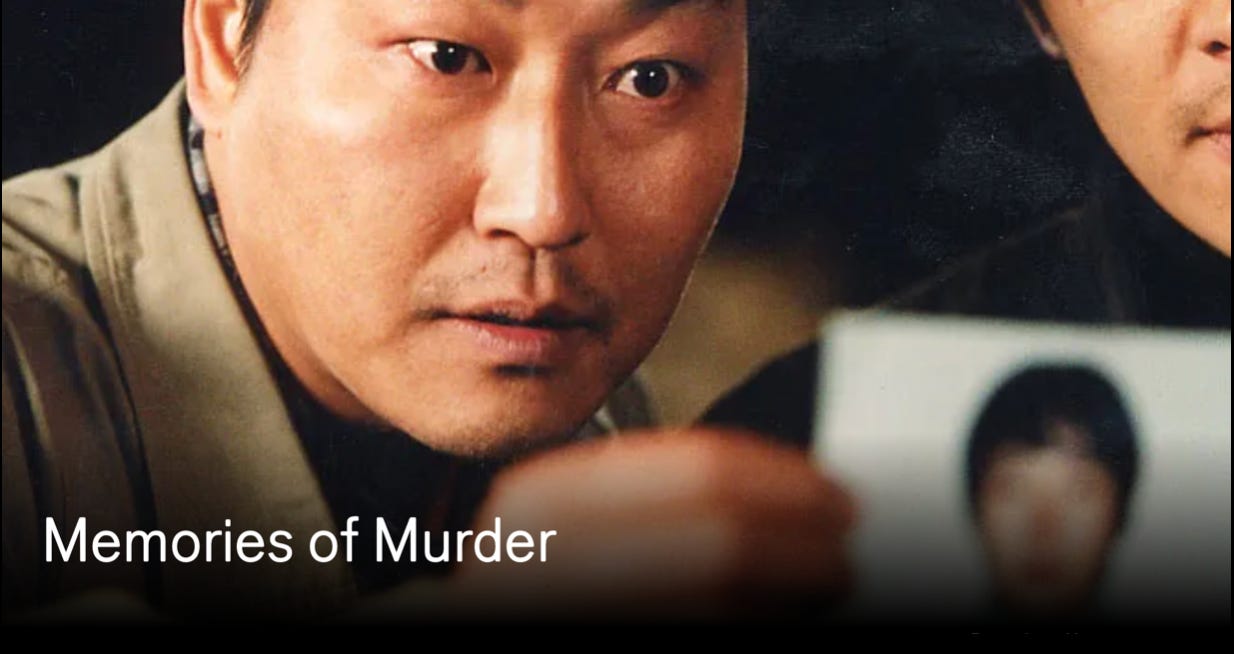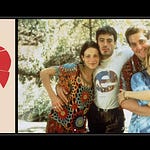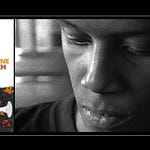Welcome to A History of Film Festivals in 100 Movies - Episode 2.
Memento, directed by Christoher Nolan. (You can hear the podcast above, or read the transcript below).
As with Sex Lies & Videotape, Memento is another great example of a low budget indie, taking film festivals by storm, and establishing an emerging filmmaker with a distinctive voice.
We’re going to explore how his story intersects with one of the best film festivals in the World, by any measure, the International Film Festival Rotterdam, in the Netherlands, which happens to be going on RIGHT NOW!
Episode 2 - Memento
There's something about nonlinear storytelling that usually manages to elevate the viewing experience. It style showcases the power of the movies, and film as an artistic medium. Memento is one of the best examples. Only his second movie, this is really the film that brought Nolan into the public eye.
After premiering in Venice, and playing a few more strong festivals, it made its way to Rotterdam, one of the top 10 film festivals in all the world.
Rotterdam Overview
The International Film Festival of Rotterdam (IFFR) champions boundary-pushing cinema, celebrating films with unique visions and revelations, from cultures far and wide. In its current form, with an average of 275,000 visits and over 2,000 film professionals from over 100 countries, IFFR is one of the largest audience and industry-driven film festivals in the world.
In addition to showcasing hundreds of films, the Festival also present Cinemart - assisting filmmakers with co production opportunities, and the Hubert Bals fund, providing the much needing financial support for a number of films.
In terms of a city, Rotterdam is an urban powerhouse with a skyscraper-lined skyline, buzzing nightlife, and dynamic cultural scene. Almost completely reconstructed post-World War II, it's Europe's biggest harbor and a hub of innovation that's famous for its ever-changing architecture and urban redevelopments.
The first festival, then called Film International, was organized in June 1972 under the leadership of Hubert Bals. The Festival profiled itself as a promoter of alternative, innovative and non-commercial films, with an emphasis on the Far East and developing countries. Famously, seventeen people attended the opening night of the first Film International Rotterdam on 28 June 1972.
A driving force, famous figurehead and inspirational director until his early death in 1988, Hubert Bals gave the festival its solid reputation of commitment to and active support of independent cinema as well as meeting place for filmmakers, audiences, film professionals and film critics.
The Fund has supported more that 1,000 projects, with grants of up to 10,000 euros for script and project development and up to 20,000 euros for post-production.
The non-competitive character of Rotterdam would change in 1995, when the Tiger Awards were introduced, three prizes for young filmmakers making their first or second film. One of the early Tiger Award winners was Christopher Nolan, in 1999, with his first film, Following. We’ll soon trace that journey, but first a little more of his personal history.
Christopher Nolan was raised by an American mother and a British father, and his family spent time in both Chicago and London. As a child, he attended Haileybury, a boarding school just outside London. From a young age Nolan was interested in moviemaking and would use his father’s Super-8 camera to make shorts. He was influenced by George Lucas’s Star Wars trilogy and by the immersive dystopian films of Ridley Scott. After attending University College London, where he studied English literature, Nolan began directing corporate and industrial training videos, and made several short films, before he would embark on his first feature that would land in Rotterdam.
The Festival has had its share of international filmmakers in those early years, including European figures like Manoel de Oliveira and Raul Ruiz.
And another master storyteller, John Sayles made his directorial debut with Return of the Secaucus 7, which was featured in Rotterdam in 1982. Here’s a fun clip on Progressive Rock from the film, where we get a taste of his keen sense of dialogue.
Sayles would direct two more films released in 1983, including Baby It’s You, which included some Springsteen music.
Sayles would then go on to Direct 3 music videos for the The Boss (Born in the USA; I’m on Fire; Glory Days) in 1984-85.
After a number of other projects, Sayles would be back in Rotterdam with another well written movie, Lone Star in 1997, which would gross over 13 million with a budget of less than 5. And Sayles would earn an Oscar nomination for best Original Screenplay, a story that gracefully moves backwards and forwards through time, which would become one of Nolan’s trademarks.
The Origins of Memento
While Lone Star was enjoying its festival run in 1996, the Nolan brothers. Christopher and Jonathan were making a cross country trip, From Chicago to California. So Christopher could relocate to the West Coast. It was during this drive that Jonathan pitched his idea for a short story, one he would later name Momento mori. Christopher loved the idea for the short story, which would inspire him to write the screenplay, based on a number of ideas from Jonathan’s story.
There are plenty of differences between the story and the movie script. Earl is confined to a mental institution and the main character in the movie is not. But, as with the Memento film, his wife was killed by an anonymous man, and during the attack on his wife, Earl loses his ability to create new long-term memories. Like Leonard in the movie, Earl leaves notes to himself and has tattoos with ideas about the killer.
However, in the short story, Earl convinces himself through his own written notes to escape the mental institution and murder his wife's killer.
Jonathan would head back to DC to finish college at Georgetown, and two months later, Christopher came up with the idea to tell the film story backwards, and continued to work on the screenplay. They would exchange drafts over the coming months. Jonathan Nolan would see his story published in the March 2001 edition of Esquire magazine.
Here is Jonathan, reading his short story.
As brilliant as Memento was, as a script, it would cost more money then Nolan had access to at this stage of his career. He needed to make a smaller feature first. Which would be…
Following
Ironically, Nolan found himself the victim of a burglary.
Most people would be distraught if their apartment had been broken into and their things stolen, Not Nolan. His knee jerk reaction - curiosity. He wondered what the burglars were thinking as they went through his belongings.
In time, he would shape these ideas into a story for a feature-length film he called Following.
All of Nolan’s trademarks and obsessions would be there: the nonlinear structure, the idea of memory. Shot in pieces, mainly on weekends over the course of a year, on black-and-white 16 mm film stock bought by the twenty-eight-year-old Nolan. He also served as the cameraman.
One roll at a time, Following was produced by Nolan and his future wife, Emma Thomas; for roughly five thousand dollars, two thousand dollars less than Robert Rodriguez’s El Mariachi (1992) and about twenty thousand less than Kevin Smith’s Clerks (1994).
Just as the Batman logo was found on the apartment door in Following, foreshadowing his eventual cinematic involvement with the Caped Crusader, Following’s unique structure introduces us to the puzzle-like aesthetic, a storytelling style that Nolan would build his career on.
Indie-film guru Peter Broderick (via IFC ‘s Next wave division) would give Nolan much-needed finishing funds), Following premiered at the 1998 San Francisco Film Festival, went on to screen at Toronto and Slamdance (having been rejected by Sundance), and then Rotterdam, where he won the Tiger Award for this first feature.
I happened to be in Rotterdam in 1999, as the Fest director for AFI. And I had an opportunity to thank him for sharing his movie with Slamdance the month before.
Eventually, the film finally earned a small theatrical release from Zeitgeist Films, during which, despite enthusiastic reviews, it brought in all of fifty thousand dollars.
Thanks to his success on the circuit with Following, and girlfriend at the time, now wife and producing partner Emma Thomas, who he met at University College London, who shared the script for Memento with Newmarket, he was off to the races. With a 4.5 million dollar budget.
The film would be shot in 25 days, and star Guy Pearce . Brad Pitt was interested, having liked the script, but there were schedule conflicts, or so the story goes, so Pearce landed the role.
As you may recall, Nolan chose to play with time, as a structural and storytelling device with Memento, even more than with Following. He called it Pizza Delivery Scenerio:
With people watching movies on TV leading up to Memento’s release, the director felt films were sacrificing quality in favor of accessibility to viewers opting to leave the room.
“I think that film narrative has been held back by television," Nolan told the Los Angeles Times. "It comes down to what I call the pizza delivery scenario: If a pizza arrives while you're watching TV, you have to answer the door, deal with the man, and then be able to get straight back into the story, having missed three or four minutes. With Memento, on the other hand, if you come in three minutes late you miss the whole movie.”
The film gained substantial word-of-mouth press from the film festival circuit. It premiered at the 2000 Venice Film Festival, where it received a standing ovation, and afterwards played at Deauville American Film Festival the Toronto International Film Festival, and the Sundance Film Festival, where it played in January 2001, before heading to Rotterdam.
Memento was theatrically released in the United States on March 16, 2001. It was acclaimed by critics, who praised its nonlinear structure and themes of memory, perception, grief, and self-deception. It was also a commercial success, earning $40 million over its $9 million budget and gained a cult following. Memento received many accolades, including the Waldo Salt Screenwriting Award at the Sundance Film Festival, and Academy Award nominations for Best Original Screenplay and Best Film Editing.[ Independent spirit awards 4-incl Dir, script, feature In 2017, the United States Library of Congress deemed the film "culturally, historically, or aesthetically significant" and selected it for preservation in the National Film Registry. Six critics listed it as one of the best films of the 2000’s.
“A lot of people know that Memento came to Sundance. A lot of people know that it was a hit, and it enabled so much more that came after it for us. But not a lot of people know that what really happened with that film is we finished it and then somebody, not me, had the bright idea of screening for all of the independent distributors at the same time to try and sell the film, get a bidding war going or whatever. And they all passed…No one wanted the film. In the year or so after that, we were in terrible limbo, we never knew whether anyone would ever see this film.”
Christopher Nolan
Impressed by his work on Memento, filmmaker Steven Soderbergh recommended Nolan to Warner Bros. to direct the psychological thriller Insomnia (2002), A remake of the 1997 Norwegian thriller of the same name. The film would be produced by Soderbergh and George Clooney, under their Section 8 banner
Now having a strong relationship with WB, he would then pitch a new take on the Batman origin story (a hero we know he was fond of thanks to the Batman logo used in Following).
Rotterdam Continues to Thrive
They would show - Memories of Murder (2004), the second film by Parasite director, and and Old Joy (2006) by Kelly Reichardt.
They would continue to host unique special events.
In 2020, Bong Joon Ho even brought Parasite to the Festival to show in Black and White.
And Cinemart was working. Founded in 1983, to serve as a "regular film market," and later modified the business model to serve instead as a "co-production market", Cinemart helps a selected number of film producers connect with possible co-producers and funders for their film projects.
One such project, for example, was auteur Yorgos Lanthimos‘ film “The Lobster.” which had just 25,000 Euros in place on a 1.9 million Euro budget. This would eventually get made, and be his first English language production.
Lanthimos would make several more films, including The Favourite (which was nominated for many Oscars, including Yorgos for best director and Olivia Coleman winning best actress) until making this year’s Poor Things (nominated for 11 Oscars this year, including director and Best Picture of the year)
“There are few places other than Rotterdam in January where one might watch Phantom Thread scored live by an orchestra, spend a night in a hotel-like installation, catch up with Best Picture Oscar nominees, experience multi-projector performances, debate the future of distribution, listen to Paul Schrader tell stories about Nicolas Cage and take a chance on new work by hundreds of filmmakers, the majority of whom scrape together small budgets through independent means. IFFR presents a whirlwind of options, held in a variety of quality venues, all within reasonable walking distance, and my experience of it was free of avoidable glitches, which is no small feat.”
Darren Hughes of Filmmaker Magazine.
Of this year’s Festival, Incoming IFFR Managing Director Clare Stewart says
“My second time at the festival was in 1999, when Christopher Nolan won the Tiger Award for Following. This is a festival of discovery. If you’re committed as a professional to what it means to find new talent this festival has it in spades.”
Of course, Nolan’s career continued to evolve, from the ultimate mind game Inception to Dunkirk, and now of course, his latest smash Oppenheimer could take home best picture, and finally give him the Oscar for Best Director he so deserves.
If you’re interested in Nolan’s top 10 movie picks:
In 2013 Criterion Collection released a list of Nolan's ten favourite films from its catalogue, which included The Hit (1984), 12 Angry Men (1957), The Thin Red Line (1998), The Testament of Dr. Mabuse (1933), Bad Timing (1980), Merry Christmas Mr. Lawrence (1983), For All Mankind (1989), Koyaanisqatsi (1982), Mr. Arkadin (1955), and Erich von Stroheim's Greed (1924) (unavailable on Criterion).[133]
And that’s a wrap for Episode 2 - Memento by Christopher Nolan. Thanks for joining me for a History of Film Festivals in 100 Movies. I’m your host Jon Fitzgerald. And a big thank you to all the filmmakers, film festivals, writers and historians who contributed to this piece.
If you have not already done so, please do subscribe to our Substack page for On the Circuit, and for weekly movie and series picks, sign up for our Cause Cinema Spotlight, which can be found on Substack as well.
Until the next episode, you take care.
















Share this post